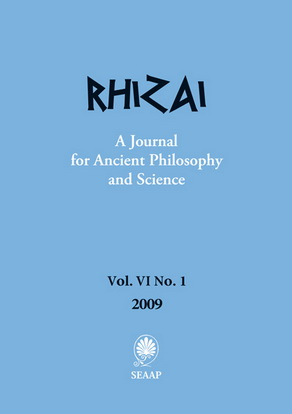Falsity and the False in Aristotle’s Metaphysics D
Falsity and the False in Aristotle’s Metaphysics D
Author(s): Spyridon RangosSubject(s): Philosophy
Published by: Издателство »Изток-Запад«
Keywords: Aristotle; Metaphysics; falsity; factual falsity; propositional falsity; ethical falsity; Antisthenes; contradiction; substance; ontology; logic
Summary/Abstract: In Metaphysics Delta 29 Aristotle distinguishes three classes of falsity and three corresponding senses of the ‘false’. The paper examines Aristotle’s arguments from a close-reading perspective, and analyses (i) the meaning of false ‘as a thing’ (with which Aristotle begins his account), (ii) the significance of Aristotle’s dispute with Antisthenes on the subject of contradiction and verbal falsehood, and (iii) Aristotle’s conception of the false person. By paying attention to the precise order of Aristotle’s presentation, the paper raises the question about the manner in which the three classes of falsity are related to one another and provides a tentative answer that could explain why the ‘false’ is included in the philosophical dictionary of the Metaphysics. On the proposed interpretation, Aristotle assumes that a fundamental difference operates in all cases of falsity (be they ‘factual’, ‘propositional’ or ‘ethical’), and that this difference is the outcome of the ontological determinacy of substance.
Journal: Rhizai. A Journal for Ancient Philosophy and Science
- Issue Year: VI/2009
- Issue No: 1
- Page Range: 7-21
- Page Count: 15
- Language: English
- Content File-PDF

